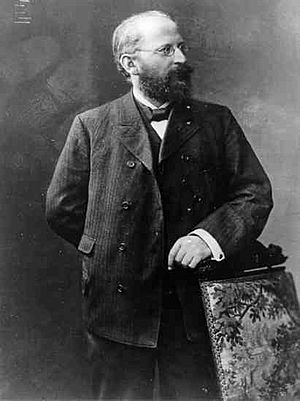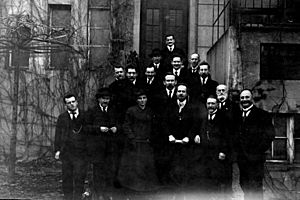Eduard Bernstein facts for kids
Eduard Bernstein (born 6 January 1850 – died 18 December 1932) was an important German politician and thinker. He was a member of the Social Democratic Party of Germany (SPD). Bernstein was close to Karl Marx and Friedrich Engels, who were famous for their ideas about society and economics. However, Bernstein later started to see what he believed were mistakes in Marx's thinking. He began to question some of Marx's theories, especially those about history and how society changes.
Quick facts for kids
Eduard Bernstein
|
|
|---|---|
 |
|
| Member of the Reichstag from Brandenburg |
|
| In office 7 June 1920 – 20 May 1928 |
|
| Constituency | Potsdam (Teltow-Beeskow-Charlottenburg) |
| Member of the Imperial Reichstag from Silesia |
|
| In office 13 January 1912 – 10 November 1918 |
|
| Preceded by | Otto Pfundtner |
| Succeeded by | Reichstag dissolution |
| Constituency | Breslau-West |
| In office 31 October 1901 – 25 January 1907 |
|
| Preceded by | Bruno Schönlank |
| Succeeded by | Otto Pfundtner |
| Constituency | Breslau-West |
| Personal details | |
| Born | 6 January 1850 Schöneberg, Kingdom of Prussia |
| Died | 18 December 1932 (aged 82) Berlin, Free State of Prussia, German Reich |
| Political party | SDAP (1872–1875) SPD (1875–1917) USPD (1917–1919) SPD (1918–1932) |
|
Philosophy career |
|
| Era | Modern philosophy
|
| Region | Western philosophy |
| School | Socialism |
|
Main interests
|
Politics, economy, sociology |
|
Notable ideas
|
Social democracy Revisionism |
|
Influenced
|
|
Contents
Early Life and Political Start
Bernstein was born in Schöneberg, which is now part of Berlin. His parents were Jewish and were active in their local temple. His father worked as a train driver. After leaving school, Bernstein worked in banks as a clerk from 1866 to 1878.
His political journey began in 1872. He joined a socialist party called the Social Democratic Workers' Party of Germany. This party followed some of Karl Marx's ideas. Bernstein quickly became known as an activist.
His party competed against another socialist group, the Lassalleans, named after Ferdinand Lassalle. Neither party could win enough votes on their own. So, in 1875, Bernstein, along with August Bebel and Wilhelm Liebknecht, helped bring the two parties together. This meeting happened in a town called Gotha. Karl Marx later criticized this agreement, feeling it gave too much power to the Lassalleans.
In 1877, the new Social Democratic Party of Germany (SPD) gained many votes. However, in 1878, two attempts were made to assassinate Kaiser Wilhelm I. Even though the SPD was not involved, the German Chancellor Otto von Bismarck used this as an excuse. He introduced laws that banned all socialist groups, meetings, and publications. These were called the Anti-Socialist Laws.
The SPD was practically outlawed and faced strong pressure across Germany. But Social Democrats could still run for election as individuals. Despite being persecuted, the party actually gained more votes in later elections.
Living in Exile
Bernstein strongly disagreed with Bismarck's government. This made it unsafe for him to stay in Germany. Just before the Anti-Socialist Laws started, Bernstein moved to Zurich, Switzerland. He became the private secretary for Karl Höchberg, a rich supporter of social democracy. An arrest warrant was issued for him, so he could not return to Germany for over 20 years.
In 1888, Bismarck convinced the Swiss government to expel some important German socialists. So, Bernstein moved to London, England. There, he spent time with Friedrich Engels and Karl Kautsky. Soon after arriving in Switzerland, he started to see himself as a follower of Marx's ideas.
Bernstein became very involved with Der Sozialdemokrat (Social Democrat), a newspaper for socialists. He later became its editor for 10 years. During the 1880s, Bernstein became known as a major thinker for the party and a true follower of Marx. He had a close friendship with Engels, who was impressed by Bernstein's energy and ideas.
In 1895, Engels was upset when he found out that his introduction to a new book by Marx had been changed by Bernstein and Kautsky. The changes made it seem like Engels supported a peaceful way to achieve socialism, which was not exactly what he meant.
From 1896 to 1898, Bernstein wrote articles called Probleme des Sozialismus (Problems of Socialism). These articles led to a big debate within the SPD about his ideas, which were called "revisionism" (meaning a revision or change of original ideas). In 1899, he published a book called Die Voraussetzungen des Sozialismus und die Aufgaben der Sozialdemokratie (The Prerequisites for Socialism and the Tasks of Social Democracy). His ideas in this book were very different from those of other party leaders.
Return to Germany
In 1901, Bernstein was finally able to return to Germany. That year, he became an editor for the newspaper Vorwärts. From 1902 to 1918, he was a member of the Reichstag, which was the German parliament.
In 1913, he voted against spending money on weapons, along with other members of his party. Although he voted for war funding in August 1914, he later opposed World War I from July 1915. In 1917, he helped start the Independent Social Democratic Party of Germany (USPD). This party brought together socialists who were against the war.
Bernstein was a member of the USPD until 1919, when he rejoined the SPD. From 1920 to 1928, he was again a member of the Reichstag. In 1920, he joined a parliamentary committee that was investigating who was responsible for World War I. Bernstein was one of the few members who admitted that Germany was partly to blame for the war. He retired from political life in 1928.
Death and Legacy
Eduard Bernstein passed away on 18 December 1932 in Berlin. There is a special plaque in his memory at his former home in Berlin. His grave in the Eisackstrasse Cemetery is considered a "grave of honour" in Berlin.
Bernstein's Ideas
Views on Socialism
Bernstein was often criticized by strict followers of Marx, like Karl Kautsky and Rosa Luxemburg, for his "revisionism." They felt he was changing the core ideas of Marxism too much.
However, Bernstein still believed in socialism. He thought that socialism would come about gradually as capitalism improved and led to social democracy. He believed that as workers gained more rights, their reasons for being upset would lessen, and there would be less need for a sudden revolution. Bernstein famously said that for him, the final goal of socialism was not the most important thing; instead, progress towards that goal was everything.
Rosa Luxemburg argued that socialism should come through a social revolution. She believed that Bernstein's ideas meant giving up on revolution and making social reform the main goal instead of a way to achieve a bigger change.
Foreign Policy
Between 1902 and 1914, Bernstein was very interested in foreign policy. He wrote many articles about it. He supported policies for Germany that were strongly nationalist and aimed at expanding Germany's influence.
Bernstein thought that high taxes on imported goods (called protectionism) only helped a few people. He believed it was "anti-progressive" because it hurt ordinary people. He argued that Germany's protectionism was isolating the country from others, especially Britain, and could lead to conflict. Bernstein wanted Germany to have free trade, believing it would lead to peace, democracy, and prosperity for everyone.
He also believed that workers should support their country against outside dangers. Bernstein even supported the idea of colonial expansion, seeing it as a way to help "backward peoples" and bring them to a "higher civilization." However, he was worried by the Kaiser's reckless policies. He wanted Germany to have strong friendships with Britain and France and protection against Russia. He even imagined a kind of league of nations.
Other Views
Bernstein's views on Jewish matters changed over time. While he never called himself a Zionist, he became more understanding of Zionism after World War I.
He is also known for being one of the first socialists to openly support the rights of homosexual people.
Works
- Evolutionary Socialism: A Criticism and Affirmation. [1899] Edith C. Harvey, trans. New York: B.W. Huebsch, 1909. This book has also been translated into English as The Preconditions of Socialism.
- My Years of Exile: Reminiscences of a Socialist., trans. Bernard Miall, New York: Harcourt, Brace and Howe, 1921.
- Marius S. Ostrowski (ed.), Eduard Bernstein on Social Democracy and International Politics: Essays and Other Writings. Basingstoke: Palgrave Macmillan, 2018.
See also
 In Spanish: Eduard Bernstein para niños
In Spanish: Eduard Bernstein para niños
 | Selma Burke |
 | Pauline Powell Burns |
 | Frederick J. Brown |
 | Robert Blackburn |


